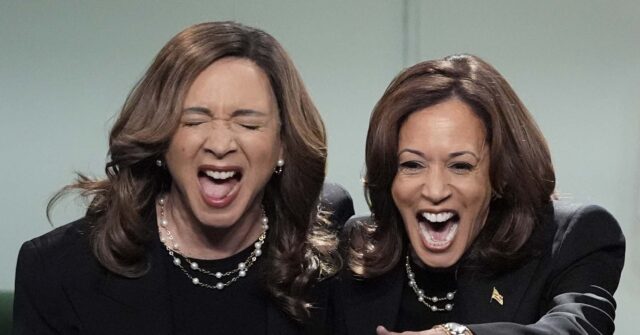In a controversial incident regarding campaign coverage, NBC has been accused of violating the Federal Communications Commission’s (FCC) “Equal Time” rule by featuring Vice President Kamala Harris in a skit on “Saturday Night Live” shortly before the election. Harris participated in the show’s cold open, sharing the screen with Maya Rudolph, who famously impersonates her. This appearance harkens back to a similar moment in 2015 when Donald Trump made a notable appearance on NBC’s “The Tonight Show” with Jimmy Fallon. Critics have pointed out that while Harris’s appearance was publicized, NBC had previously declared that they would not feature either presidential candidate on their show as part of their commitment to fairness in election coverage.
In preparation for the show’s 50th season, Lorne Michaels, the producer of “SNL,” explained in a September interview that he had intentionally refrained from inviting the real-life candidates due to election laws prohibiting this practice. He emphasized that featuring major candidates would require also accommodating all candidates, including many with limited ballot access, which added layers of complexity. Michaels indicated that the logistics of complying with the Equal Time provisions made it impractical to invite candidates, stating, “You can’t bring the actual people who are running on because of election laws.” His comments, however, now appear contradictory in light of Harris’s appearance, raising questions about NBC’s adherence to its stated policy.
The FCC’s Equal Time rule is designed to ensure fair and equitable access to the airwaves for all legally qualified candidates, particularly in the context of broadcasting. This regulation mandates that if a broadcast station offers time to one candidate, it must provide equal opportunities for their opponents to appear. While there are specific exemptions for bona fide news coverage, the underlying principle is to prevent any unfair advantages in media access during elections. Following Harris’s appearance, FCC Commissioner Brendan Carr, appointed by Trump and renewed under Biden’s administration, highlighted the apparent violation on social media, expressing concern over the implications for compliance with the established rules.
Time constraints further complicate the situation, as there is now a limited window for Trump to make an appearance on “SNL” ahead of the election. Trump famously hosted the show in 2015, an appearance that sparked significant backlash from liberal critics who believed that such engagements normalized his controversial persona. The ongoing debates surrounding media coverage of political figures underscore the challenges faced by networks in maintaining neutrality while also fulfilling their entertainment role. Critics argue that appearances by candidates on comedy shows blur the lines between serious political engagement and entertainment, complicating public perceptions.
Joel B. Pollak, a Senior Editor-at-Large at Breitbart News, has weighed in on the matter, discussing the potential implications of NBC’s actions and the broader narrative influencing public perception. His experience and writing cover topics related to Trump and his political agenda, and he often expresses views that align with a more conservative audience. Pollak’s contributions to the discourse highlight the polarized nature of media coverage surrounding elections, with different outlets frequently accused of favoring one candidate over another. This incident raises questions about the efficacy of existing regulations like the Equal Time rule in the fast-evolving media landscape.
In summary, NBC’s recent decision to invite Vice President Kamala Harris to “Saturday Night Live” just days before the election has ignited a debate about compliance with the FCC’s Equal Time rule. Lorne Michaels’s earlier commitment to not feature the presidential candidates stands in stark contrast to Harris’s appearance, prompting scrutiny from FCC officials. The Equal Time rule’s purpose, to ensure fair access for all candidates, becomes particularly relevant as the clock runs down on the election and former President Trump finds himself at a disadvantage. The narratives surrounding the involvement of media in politics continue to evolve, illustrating the ongoing tensions between entertainment and electoral engagement.

